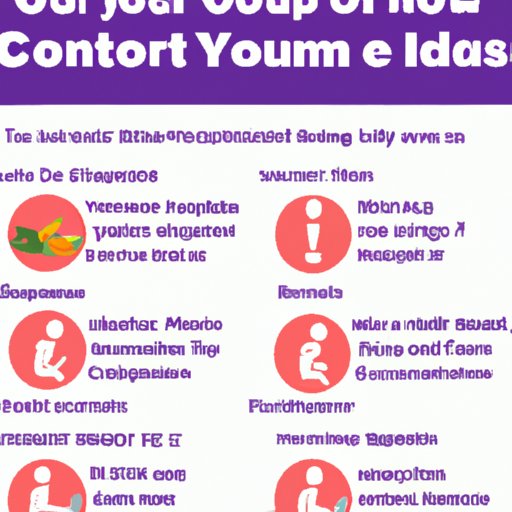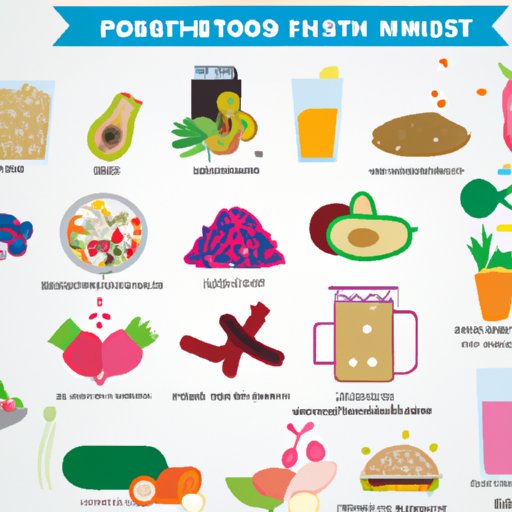Introduction
Constipation is a common digestive disorder that can be caused by a variety of factors. It is characterized by infrequent bowel movements, hard stools, abdominal pain or bloating, and difficulty passing stool. While it can be uncomfortable and even painful, there are many dietary changes that can be made to help alleviate the symptoms of constipation and improve digestive health.

A Guide to Eating for Constipation Relief
Making dietary changes to combat constipation can be an effective way to find relief. Eating the right kinds of foods can help promote regularity and ease the symptoms of constipation. Here are some of the best foods to eat for constipation relief:
Fiber-Rich Foods
Fiber is essential for promoting regularity and relieving constipation. Fiber absorbs water in the intestines, which helps soften stools and make them easier to pass. Good sources of fiber include whole grains, legumes, fruits, and vegetables. Aim to get at least 25 grams of fiber per day, but increase your intake gradually to avoid gas and bloating.
Probiotic Foods
Probiotics are beneficial bacteria that live in the gut and help maintain a healthy balance of bacteria in the digestive tract. Probiotic-rich foods such as yogurt, kefir, sauerkraut, kimchi, and miso can help keep your digestion regular and reduce constipation.
Water
Staying hydrated is essential for maintaining regularity and preventing constipation. Drinking plenty of fluids helps keep stools soft and easy to pass. Aim to drink eight 8-ounce glasses of water per day, or more if you are active or live in a hot climate.
Magnesium-Rich Foods
Magnesium is a mineral that helps relax the muscles in the digestive tract and encourages regular bowel movements. Good sources of magnesium include dark leafy greens, nuts, seeds, legumes, and whole grains. Consider taking a magnesium supplement if your diet is lacking in these foods.
Fruits and Vegetables
Fruits and vegetables are packed with vitamins, minerals, and fiber that can help relieve constipation. Fruits and vegetables also contain antioxidants that can help protect against inflammation and improve overall gut health. Aim to eat at least five servings of fruits and vegetables each day.
Whole Grains
Whole grains are high in fiber and other nutrients that can help promote regularity and relieve constipation. Examples of whole grains include oats, barley, quinoa, brown rice, and bulgur wheat. Try to incorporate at least three servings of whole grains into your daily diet.
Healthy Fats
Healthy fats such as olive oil, avocados, nuts, and seeds are important for maintaining a healthy digestive system. Healthy fats can help reduce inflammation, promote regularity, and relieve constipation. Incorporate healthy fats into your diet every day, but limit saturated and trans fats.
How to Eat for Improved Digestive Health and Relief from Constipation
In addition to eating the right kinds of foods, there are other dietary changes you can make to help relieve constipation. Here are some tips for improving your digestive health and finding relief from constipation:
Increase Fiber Intake Gradually
Increasing your fiber intake too quickly can lead to digestive distress, so it’s important to do it gradually. Start by adding small amounts of fiber-rich foods to your diet and slowly increasing your intake over time. This will give your body time to adjust and help prevent gas and bloating.
Limit Processed Foods
Processed foods are often high in sugar and unhealthy fats, and low in fiber and other essential nutrients. Limiting processed foods in favor of healthier options can help improve your digestive health and reduce constipation.
Avoid Diuretics
Diuretics, such as coffee and alcohol, can dehydrate the body and cause constipation. Avoiding diuretics can help keep your body hydrated and promote regularity.
Stay Hydrated
Staying hydrated is essential for keeping your digestive system running smoothly. Aim to drink eight 8-ounce glasses of water per day, or more if you are active or live in a hot climate.
Exercise Regularly
Regular exercise can help stimulate the digestive system and promote regularity. Aim to get at least 30 minutes of moderate exercise most days of the week.
Conclusion
Constipation can be uncomfortable and even painful, but making dietary changes can help relieve the symptoms. Eating the right kinds of foods, such as fiber-rich foods, probiotic foods, water, magnesium-rich foods, fruits and vegetables, whole grains, and healthy fats, can help improve digestive health and provide relief from constipation. Additionally, increasing fiber intake gradually, limiting processed foods, avoiding diuretics, staying hydrated, and exercising regularly can all help improve digestive health and relieve constipation.
(Note: Is this article not meeting your expectations? Do you have knowledge or insights to share? Unlock new opportunities and expand your reach by joining our authors team. Click Registration to join us and share your expertise with our readers.)
